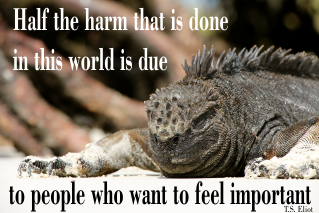










Popular Articles
Crazy-Makers: Dealing with Passive-Aggressive People
Why Are People Mean? Don't Take It Personally!
Struggling to Forgive: An Inability to Grieve
The Secret of Happiness: Let It Find You (But Make the Effort)
20 Steps to Better Self-Esteem
7 Rules and 8 Methods for Responding to Passive-aggressive People
What to Do When Your Jealousy Threatens to Destroy Your Marriage
Guide to How to Set Achieveable Goals
Catastrophe? Or Inconvenience?
Popular Audios
Audio Version of Article: Crazy-Makers: Passive-Aggressive People
Audio Version of Article: Why Are People Mean? Don't Take It Personally!
More PsychNotes: Relationships
Why Are People Mean? When You Love a Narcissist
by Monica A. Frank, PhD
When you love a narcissist, you can't compete with their first love—themselves. The constant need for admiration and attention can fatigue even the heartiest of souls. However, that is not the biggest problem for those who are in love with a narcissist.
The most serious issue for relationships is that a narcissist can be quite hurtful due to their lack of empathy and indifference to other people's concerns, needs, or wishes. As a result, they often come across as “mean” people. Not that they intend to hurt others—they just find themselves and their desires or interests more important.
T.S. Eiott said it well:
“Half the harm that is done in this world is due to people who want to feel important. They don’t mean to do harm—but the harm does not interest them. Or they do not see it, or they justify it because they are absorbed in the endless struggle to think well of themselves.”
What is a narcissist?
Psychological research has shown two types of narcissists (Rohmann, et al., 2012):1) Grandiose type. The grandiose narcissist has an inflated sense of self-importance because they truly love themselves and believe they are better than others. They tend to be vain, self-centered, and smug. They are often impervious to criticism because they believe others are wrong, jealous, or can't see the truth. Love to them is frequently a game of power and control to demonstrate their superiority.
2) Vulnerable type. The vulnerable narcissist actually has very fragile self-esteem and is sensitive to the slightest criticism. They need admiration to feel good about themselves and are frequently unhappy because they are often disappointed by others. Instead of getting the adoration, appreciation, and respect they think they deserve, others don't enjoy being around them. They tend to have an anxious attachment style which may appear to be love but is really the fear of being left alone without their admirer.
What can you do when you are in a relationship with a narcissist?
If you are in a relationship with a narcissist, your needs will never be important unless they happen to correspond to your partner's needs. You will be secondary to their first love and will always be in the role of admirer. At first, it can be exciting to love a narcissist because they are often charming, attractive people. But after awhile it can become tiring to always be a servant to their desires.When you love a narcissist you have to be satisfied with scraps. Doesn't sound very promising for a fulfilling relationship, does it? Unfortunately, you can't change a narcissist. A person can only change themselves and a narcissist usually doesn't have much incentive to change unless they come to recognize they are the cause of their failed relationships.
However, if you love a narcissist, you can work on changing yourself. First, recognize that it is not you. The narcissist will tend to blame you for all the problems in a relationship but you need to realize that you are not the cause. Instead, the narcissist is unable to have the traditional reciprocal relationship.
You may need to examine yourself, though, to determine why such a relationship is acceptable to you. Often those associated with a narcissist will gain an artificial sense of importance through the connection. So, frequently, the problem may stem from low self-esteem. Improving your self-esteem can allow you to more accurately evaluate your relationship.
Rohmann, E., Neumann, E., Herner, M.J. And Bierhoff, H. (2012). Grandiose and Vulnerable
Narcissism Self-Construal, Attachment, and Love in Romantic Relationships. European Psychologist, 17, 279–290.DOI: 10.1027/1016-9040/a000100
Copyright © 2017 by Excel At Life, LLC.
Permission to post this article is granted if it includes this entire copyright and an active link.
Permission to post this article is granted if it includes this entire copyright and an active link.














